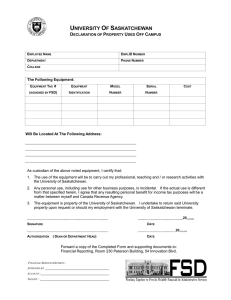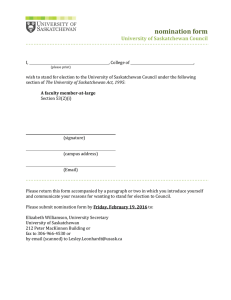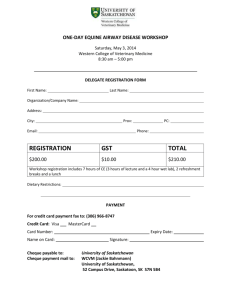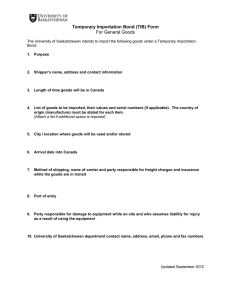University of Saskatchewan Distinguished Professorships
advertisement
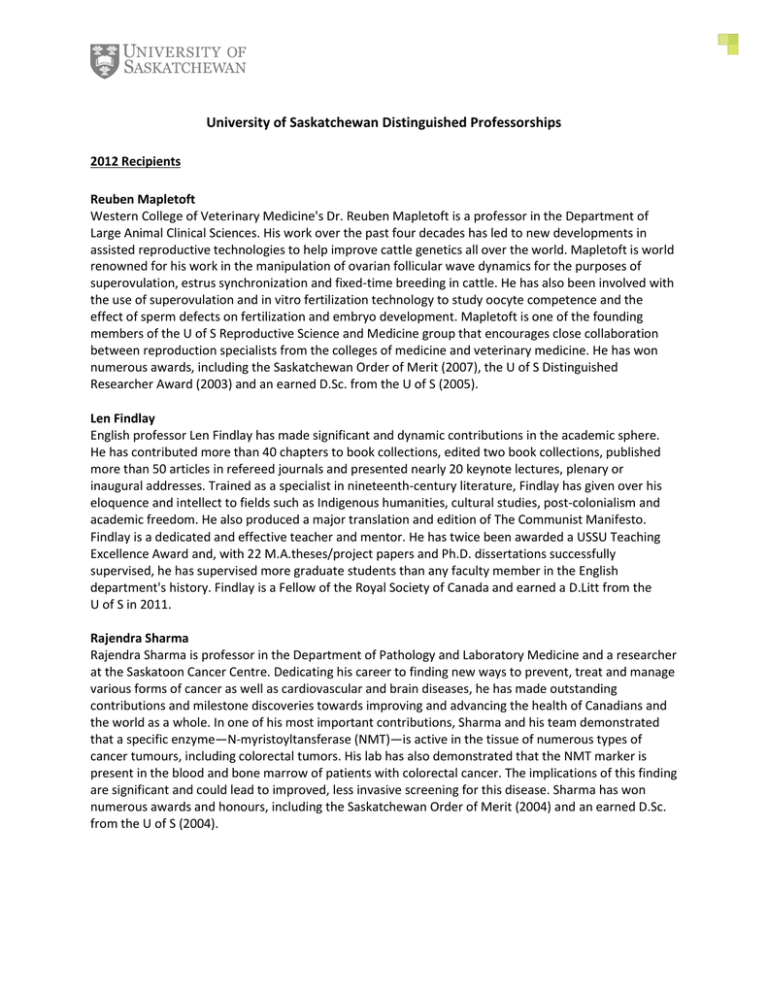
University of Saskatchewan Distinguished Professorships 2012 Recipients Reuben Mapletoft Western College of Veterinary Medicine's Dr. Reuben Mapletoft is a professor in the Department of Large Animal Clinical Sciences. His work over the past four decades has led to new developments in assisted reproductive technologies to help improve cattle genetics all over the world. Mapletoft is world renowned for his work in the manipulation of ovarian follicular wave dynamics for the purposes of superovulation, estrus synchronization and fixed-time breeding in cattle. He has also been involved with the use of superovulation and in vitro fertilization technology to study oocyte competence and the effect of sperm defects on fertilization and embryo development. Mapletoft is one of the founding members of the U of S Reproductive Science and Medicine group that encourages close collaboration between reproduction specialists from the colleges of medicine and veterinary medicine. He has won numerous awards, including the Saskatchewan Order of Merit (2007), the U of S Distinguished Researcher Award (2003) and an earned D.Sc. from the U of S (2005). Len Findlay English professor Len Findlay has made significant and dynamic contributions in the academic sphere. He has contributed more than 40 chapters to book collections, edited two book collections, published more than 50 articles in refereed journals and presented nearly 20 keynote lectures, plenary or inaugural addresses. Trained as a specialist in nineteenth-century literature, Findlay has given over his eloquence and intellect to fields such as Indigenous humanities, cultural studies, post-colonialism and academic freedom. He also produced a major translation and edition of The Communist Manifesto. Findlay is a dedicated and effective teacher and mentor. He has twice been awarded a USSU Teaching Excellence Award and, with 22 M.A.theses/project papers and Ph.D. dissertations successfully supervised, he has supervised more graduate students than any faculty member in the English department's history. Findlay is a Fellow of the Royal Society of Canada and earned a D.Litt from the U of S in 2011. Rajendra Sharma Rajendra Sharma is professor in the Department of Pathology and Laboratory Medicine and a researcher at the Saskatoon Cancer Centre. Dedicating his career to finding new ways to prevent, treat and manage various forms of cancer as well as cardiovascular and brain diseases, he has made outstanding contributions and milestone discoveries towards improving and advancing the health of Canadians and the world as a whole. In one of his most important contributions, Sharma and his team demonstrated that a specific enzyme—N-myristoyltansferase (NMT)—is active in the tissue of numerous types of cancer tumours, including colorectal tumors. His lab has also demonstrated that the NMT marker is present in the blood and bone marrow of patients with colorectal cancer. The implications of this finding are significant and could lead to improved, less invasive screening for this disease. Sharma has won numerous awards and honours, including the Saskatchewan Order of Merit (2004) and an earned D.Sc. from the U of S (2004). 2011 Recipients William (Bill) Kerr William (Bill) Kerr is one of North America's foremost agricultural economists in his specialty of international trade and innovation. The relevance of his work on subjects such as the international governance of biotechnology, the effects of free trade and the safety of traded foods has made him one of the most-cited authors in his field. He is a "thought leader" whose articles tend to frame the way others see emerging issues that affect the formulation and effectiveness of agricultural trade policy. Kerr's formidable reputation has made him a sought-after speaker nationally and around the world. For example, after the breakup of the Soviet Bloc, he was one of the world experts invited to help deliver lectures to academics in Slovakia, the Czech Republic and Poland on the market system and how to organize a curriculum to teach food policy. Back at home, he has helped shape Canadian policy thorugh service on a policy network dealing with international trade issues and assessing the Doha round of negotiations of the World Trade Organization. Ron Steer Ron Steer is widely recognized as a superlative researcher, masterful teacher, and champion for the University of Saskatchewan. A physical chemist in molecular spectroscopy, Steer's research on the behavior of organic molecules that have absorbed light is leading to new insights in the field of solar energy. He leads the Solar Photovoltaic Research Group, which is pursuing knowledge to build cheaper, more efficient solar cells to harvest the sun's energy. Over more than 30 years of fundamental curiositydriven research, Steer has worked with his colleagues and the students he has mentored to push the frontiers of knowledge and in the process create opportunities for the next generation of researchers. Bill Waiser Bill Waiser, SOM, DLitt, FRSC, has been described as "Saskatchewan's historian" for his decades of work uncovering the rich and vibrant stories from Western Canada and our province in particular. An accomplished storyteller, Waiser speaks to a general audience in his books, publications and presentations. Notable examples are Saskatchewan: A New History (2005), All Hell Can't Stop Us (2003), the story of the On-to-Ottawa trek and Regina Riot, and Who Killed Jackie Bates? (2008), an account of parents' despair and a child's tragic death during the Depression. Waiser has brought Saskatchewan history to the people through numerous television appearances including the regular CBC TV feature "Looking Back," as well as frequent interviews for other print and broadcast media. As a result, he has brought local and provincial history well beyond the realm of academia and into the minds and hearts of the public. University of Saskatchewan Distinguished Professorships 2010 Recipients James Dosman James Dosman, the “father of agricultural medicine” in Canada, has devoted his career to improving the health of, and preventing injury to, farmers and their families. He began at the U of S, then completed a residency and postdoctoral fellowship at McGill University that established him in his specialty of respiratory medicine. He returned to the U of S to found the Division of Respiratory Medicine in the College of Medicine in 1975, and, 11 years later, the Centre for Agricultural Medicine – now known as the Canadian Centre for Health and Safety in Agriculture (CCHSA). The organization is the only one in Canada to provide research, education, and health promotion to agricultural and rural populations – a crucial service to the families working in one of the most dangerous occupations in Canada and the U.S. Madan Gupta Madan Gupta is recognized internationally for groundbreaking work in fuzzy logic (mathematics of human language) and neural networks (mathematics of the human brain) and their application to advanced robotic control systems. Such systems have diverse application, from passenger trains to autofocus systems for digital cameras. A Professor Emeritus and director of the Intelligent Systems Research Laboratory at the College of Engineering, Gupta and his colleagues push the frontiers of computational fuzzy neural networks in fields such as aerospace, medicine, business, and the courts of law. He has shared his knowledge and expertise through both undergraduate and graduate courses in adaptive control systems, neuro-control systems, neuro-vision systems and fuzzy logic, as well as workshops and keynote talks around the world. He has supervised numerous international graduate students, post-doctoral fellows and visiting professors conducting research in these fields. Brian Rossnagel Brian Rossnagel is one of Canada’s best known crop scientists and one of the world’s top experts in barley and oat breeding and genetics. Based at the Crop Development Centre at the College of Agriculture and Bioresources, he is responsible for more than 90 new cultivars, several of which have become the preferred varieties for western Canadian farmers. Some are unique, such as the first hullless barley, or have set a new standard for quality, such as CDC Dancer oat. He developed the world’s first high oil, low lignin hull feed oat with a similar nutritional profile to barley, and a low-phytate barley which can help reduce the environmental impact of high intensity hog operations. David Christensen David Christensen spent most of his career in the Department of Animal and Poultry Science in the College of Agriculture and Bioresources. He began his education at the U of S and completed his graduate studies at McGill. He started his research career at Cornell University in New York before returning to the U of S. For more than four decades, Christensen built an international reputation for his research in dairy nutrition. He was among the first to recognize the importance of trace minerals in livestock production, and feed formulations based on his research have been widely adopted in western Canada. His work in developing feed applications for agricultural co-products such as canola meal helped open new international markets for Prairie grain producers. University of Saskatchewan Distinguished Professorships
